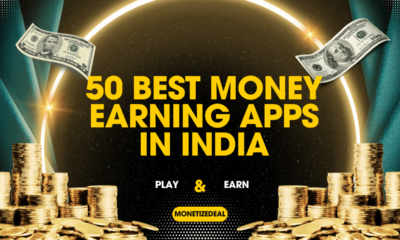Social Media
The Ultimate Guide to Facebook Affiliate Marketing Success in 2025

Last Updated on May 23, 2025 – by monetizedeal
Embark on your journey into Facebook Affiliate Marketing with our comprehensive step-by-step guide. Learn how to kickstart your affiliate marketing efforts on the world’s largest social media platform.
From setting up a Facebook page or group to cultivating a dedicated audience, selecting optimal affiliate networks, and executing impactful marketing strategies, this guide equips you with the knowledge and tools necessary to thrive as a successful affiliate marketer on Facebook.
Let’s dive in and unlock the potential of affiliate marketing in social media!
What is Facebook Affiliate Marketing?

On to the next phase of our exploration into affiliate marketing, we now focus on one of the most potent tools: Facebook. As a colossal social media and networking platform with a net worth of $815 billion since its inception in 2004, Facebook has seamlessly woven itself into the fabric of global connectivity.
Serving many purposes, from facilitating new connections to maintaining bonds with friends and family, and even fostering e-commerce activities, Facebook emerges as a multifaceted platform. And for ventures like affiliate marketing, it becomes an indispensable asset in the marketer’s toolbox.
Facebook’s role in affiliate marketing extends beyond merely driving traffic to a Facebook page or group; it also extends to external websites. While traditional affiliate marketing relies on organic search engine traffic, Facebook offers a unique advantage with its built-in audience of 2.7 billion users, making it the largest social media platform.
It is the preferred choice for 75.8% of affiliate marketers, as per one statistics. The platform boasts tens of thousands of groups and pages spanning diverse niches, providing fertile ground for marketers.
Easy Steps to start your own Facebook Affiliate Marketing business

Achieving success in any marketing field hinges on one critical factor – the audience. In affiliate marketing, a broad and well-targeted audience with the proper interest is essential for the best results.
Your efforts in affiliate marketing may become wasted without this essential step. Therefore, it is crucial to meticulously plan strategies and goals before hitting the Facebook log-in button.
Step 1 – Start by creating a Facebook page/Facebook group
Utilizing Facebook for affiliate marketing presents two distinct avenues: Facebook Pages and Facebook Groups, each offering unique approaches and challenges.
A Facebook Page serves as a centralized point under your control, akin to a website within the platform.
Here, you can disseminate various content forms—blogs, surveys, images, videos—tailored to your business niche while seamlessly integrating affiliate links.
However, the organic growth of a Facebook Page demands a comprehensive online marketing strategy, given its limited reach.
Facebook Affiliate Marketing: How to Create a Facebook Group

- Access Your Facebook Page- You must log in to your Facebook account and explore the Facebook page for which you want to create a group. Ensure you have admin privileges for the page.
- Find the “Groups” tab- On your Facebook page, locate the “Groups” tab, usually positioned on the left-hand side menu. If you don’t see it, click the “More” tab to reveal additional options.
- Click on “Create Group”- Once you’ve located the “Groups” tab, click on it to open the Groups section. Then, click on the “Create Group” button.
- Fill in Group Details- A pop-up window will appear, prompting you to fill in details about your new group. Include the group name, add members (you can do this later if you prefer), and select the privacy settings for your group (Public, Closed, or Secret).
- Choose Group Settings- Set up additional group settings according to your preferences. You can adjust settings such as membership approval (if it’s a Closed group), membership questions, posting permissions, and more.
- Click on “Create”- Once you’ve filled in the necessary details and configured your preferred settings, click the “Create” button to create your Facebook group.
- Customize Your Group- After creating the group, you can customize it by adding a cover photo, writing a description, and pinning essential posts.
- Link Group to Page (Optional)- To link your Facebook page with the newly created group, go to the group settings, navigate to the “Linked Pages” section, and select the option to link your page.
- Promote Your Group- Share your group’s link on your Facebook page, websites, or other social media sites to invite members and grow your community.
Step 2 – Build an audience!
Whether you establish a Facebook page, a group, or even both, the critical first step in your affiliate marketing journey is cultivating an audience.
Without an engaged viewership, the affiliate links embedded in your Facebook group page won’t translate into meaningful profits.
The visibility of your posts plays an essential role in the success of your affiliate marketing. Here, we will explore some necessary strategies to enhance your Facebook post and improve your affiliate to gain your desired attention.
1. Organic traffic
- Generating organic traffic on Facebook necessitates a strategic approach centred on crafting valuable content and fostering genuine engagement with your audience.
- Consistency is the key. Regularly share content that speaks directly to your target audience’s interests and needs.
- Mix up your content formats – from images to videos and interactive polls – to maintain a dynamic and captivating feed.
- Make the most of Facebook’s features, including hashtags, tagging, and location targeting, to increase the visibility of your posts.
- You must actively engage with your audience by quickly responding to comments, messages, and inquiries, nurturing a strong community around your page or group.
- Encourage followers to share your content within their networks, expanding your reach organically.
2. Paid ad
- Facebook’s advertising model operates on a pay-to-play basis, meaning reaching your target audience requires investment.
- Organic traffic is at odds with Facebook’s structure, emphasizing the need for familiarity with the platform’s Ad Manager to execute ad campaigns effectively.
- With its sophisticated ad tool, Facebook enables advertisers to craft highly targeted campaigns. Advertisers can use their ads for maximum profit by working in demographics like age, gender, location and interests.
Step 3 – Never stop improving!
It’s essential to continuously monitor and refine your affiliate marketing campaigns on Facebook to ensure they deliver the best results.
Experiment with various ad designs, messaging styles, target demographics, and ad placements to discover what connects most with your audience and generates the highest return on investment (ROI).
Facebook offers powerful targeting tools that enable you to tailor your message and promotions to specific audience segments.
Regularly monitor key performance indicators like click-through rates, conversion rates, and cost per earnings to measure campaign effectiveness and adjust your strategies based on data insights.
Pros and Cons of Facebook Affiliate Marketing
Pros of Face Affiliate Marketing:
- Engagement Opportunities: Facebook’s features, such as comments, likes, shares, and Messenger, allow you to interact with marketers and your audience, fostering engagement and brand loyalty.
- Cost-Effective Advertising: Compared to other traditional advertising methods, Facebook’s ad provides more cost-effective options for affiliate marketers, which allows them to reach their audience efficiently.
- Analytics and Insights: Facebook provides summary analytics and information about campaign performance, which allows marketers to track key metrics like reach, engagement, and conversions and optimize their strategies accordingly.
Cons of Facebook Affiliate Marketing:
- Algorithm Changes: Facebook frequently updates its algorithm, which can impact the reach and visibility of affiliate marketing content. Marketers may need to adapt strategies to accommodate these changes, potentially affecting campaign performance.
- Competition: The popularity of Facebook as an advertising platform means that competition among affiliate marketers is fierce. Standing out in the crowded marketplace requires creativity, strategic targeting, and compelling content.
- Ad Approval Process: The Facebook ad process is difficult as there are certain products and content categories
- Facebook’s ad approval process can be complicated, with certain products or content categories facing restrictions or outright rejection. This can limit the affiliate offers marketers can promote on the platform.
Conclusion
Facebook Affiliate marketing offers great opportunities for marketers to reach and engage with a vast audience. There are many social sites available that provide strong targeting capabilities and cost-effective options. However, finding the platform requires an understanding of the platform’s dynamic and competition, among other things.
By carefully balancing the advantages and challenges, affiliate marketers can use the power of Facebook to drive meaningful engagement, conversions, and long-term success in their campaigns.
To learn more about Affiliate marketing and commission rates, check out our blogs [Monetizedeal blog].


 List8 months ago
List8 months ago50 Best Telegram Channels For Movies and Web Series

 List9 months ago
List9 months ago30 Best Dream 11 Prediction Telegram Channels in India | IPL 2025

 List8 months ago
List8 months ago10 Best Telegram Channels for Forex Trading Signals

 Make Money Online7 months ago
Make Money Online7 months ago50 Best Money Earning Apps in India Without Investment

 List11 months ago
List11 months ago300+ Funny YouTube Channel Name Ideas | Top Comedy Channel name

 Finance11 months ago
Finance11 months ago25 Best Telegram Channels for Stock Market, Bank Nifty and Intraday Trading

 List11 months ago
List11 months ago20 Best SEBI Registered Telegram Channels in India 2025

 List4 months ago
List4 months ago120 Best Telegram Channel Links to Join in 2025


















